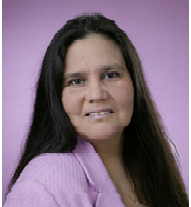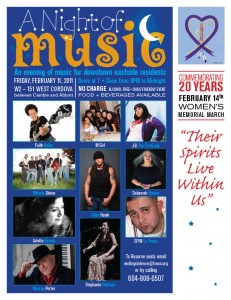Presentation to the House of Commons
Standing Committee on the Status of Women
Violence Against Aboriginal Women
By Beverley Jacobs
January 18, 2011
This presentation is dedicated to my cousin Tashina General, her unborn child, Tucker and to all of the missing and murdered Aboriginal women, their unborn children, their children and their mothers, fathers and families. I have come to know so many families across Canada and I pray that justice is served for those families who are still waiting for their missing loved ones to come home and for those families who have had to bury their loved ones as a result of the horrific violence of murder. I am a family member who is well aware of violence; as a child, as a young girl, as a young woman. I am a survivor of violence. I devote the rest of my life to end violence of all forms.
There are many concerns being raised by many Aboriginal women and families who were part of the SIS initiative, who I still continue to advocate for, about this Committee’s “study” on violence against Aboriginal women. What is your mandate? What is it that you are trying to find out that is any different than the many studies that have been done already (ie. RCAP, AHF, Aboriginal organizations, women’s organizations, Inquiry Reports, Research Studies, Stolen Sisters report, SIS report?) There has already been millions of dollars poured into these research studies and thousands of recommendations that need to be implemented. How much did it costs for this Committee’s study? We don’t need another study. We need action. I believe that the HOC “Study” and its process are creating more silencing for Aboriginal women…and this is violence!
Let me explain…many families of the missing and murdered were and are unaware of this process. When they did find out, they were unaware of the process to present. They did attend some of your sessions already but were not able to present. They continue to be frustrated, not only about the continued injustices that they face. They are frustrated and angry that a study is being done without their input….well-needed input, as they have the direct experience to present to this committee. So, I would respectfully, request that this Committee meet specifically with families of the missing and murdered.
As I said in my speech in response to the government’s residential school apology, respect is needed for Aboriginal women. Action by government is needed to show that the apology is genuine. The impacts of residential school have created a cycle of violence that continues to this day. There are all types of violence…physical, emotional, mental, spiritual, sexual, racialized and sexualized (direct targets of violence against Aboriginal women). All of these issues of violence have been studied with tonnes of recommendations…we need government to act on these recommendations!! We need to look at the resources that are being used right now…what is working…what is not working…this is the type of study that has to be done? If there are resources being put towards violence against women, why is here still so much violence? Why are there still so many women going missing and found murdered? Where are the prevention resources? Where are the educational resources?
Although I respect that this committee is doing this study, and hearing from people in 10 cities, there is no political will to put the resources where they are needed…to actually end violence against Aboriginal women. The resources are needed to revitalize traditional teachings about respect for women as the life-givers, to revitalize the language where those teachings originate from, to provide needed counselling and healing services for both men and women to heal from the violence.
We are dealing with violence internally in our own communities… with our own men are doing the violating!!
We are dealing with violence externally from white men….impacts of racism and sexism…racialized violence (ie. Helen Betty Osborne/Pamela George)!!
Today, there is momentum growing in the grassroots community without government resources. Families of the missing and murdered and individual Aboriginal women are healing and leading the charge to end this violence. But in order for there to be redress and reconciliation, with government actually taking some responsibility for the root of that cycle of violence (ie residential schools), government must provide those needed resources.
There are needs for those families…real needs…and they are different for families of the missing and for families of the murdered:
Needs for Families of the Missing. Resources are needed for:
- Searches
- Rewards
- Travel when families receive tips
- Publicity
- Healing services (loss and grief counselling, access to elders)
- Family gatherings
Needs for Families of the Murdered. Resources are needed for:
- Assistance in court (knowledge of the process)
- Victims services trained with cultural knowledge (services must be culturally relevant ie family, healers, elders, community)
- Healing services (loss and grief counselling, access to elders)
- Resources (time off from work to attend court, travel to court)
- Family Gatherings
One final recommendation that this government can do:
Enact Legislation that deals with ending violence against Aboriginal women
Despite everything, healing is occurring in our communities without government involvement. It is our responsibility as women to heal, to learn the teachings of our ancestors about our responsibilities, and to be role models to empower our young girls and other women in our communities…and to protect the elderly in our communities. Healing needs to happen so that our women (and our men ) know their worth, to know their beauty and to know their rights! We as a people are resilient people despite all of the violence. We continue to walk with our heads held high. We will continue to equip our men, women, young people with the tools to stand up and respect themselves.
Finally, all of us need to make the connection of violence of women to the violence that is occurring to our Mother, the Earth. Until this is recognised by all human beings, we will continue down this road of destruction of all life. I know that I have made the commitment to end this violence for my future generations. Are you thinking 7 generations ahead?
BEVERLEY JACOBS, LL.B., LL.M., PhD Student
Mohawk Nation of Haudenosaunee (Iroquois) Confederacy, Bear Clan

Beverley’s Mohawk name is Gowehgyuseh. It means; “She is visiting.” Her home community is Six Nations of the Grand River Territory in Southern Ontario, where she is currently practicing law. She is also currently working on an interdisciplinary PhD in Law, Sociology and History at the University of Calgary, Calgary, Alberta.
She has earned a Bachelor of Law Degree from the University of Windsor in 1994 and a Masters of Law Degree from the University of Saskatchewan in 2000. Beverley Jacobs has been a Professor at various educational institutions in Ontario and Saskatchewan, and now Alberta, where she is teaching a course, Indigenous Governance, and coaching law students to prepare for the 2011 Kawaskimhon Moot (Aboriginal Law). She teaches courses on Self-Determination, Canadian Indian policies, Canadian Law and Aboriginal People, First Nations Women and the Law, and Indigenous Law, just to name a few. She is also a public speaker and has made numerous presentations across the globe on various issues affecting Indigenous people and specifically, Indigenous women. She is a former President of the Native Women’s Association of Canada. In her five year term (2004-2009), she raised awareness about the missing and murdered Aboriginal women, the issues of violence against women and girls, matrimonial real property rights and impacts of colonization on Aboriginal women. The highlight was responding to the federal government’s Residential School apology at the House of Commons parliamentary floor. In addition, Beverley participated and made numerous interventions at various international fora and traveled to many communities, locally, regionally, nationally and internationally.
Amidst her impeccable professional portfolio is Amnesty International, a human rights organization that contracted Beverley to research, advise and write the first draft of the Stolen Sisters…, a sobering report, released in 2004, that brought international attention to the issue of missing and murdered Aboriginal women in Canada. In October 2008, Beverley was one of fifty women recognized by several Canadian peace organizations for her work and dedication to further a culture of peace in Canada. In November, 2008, she became a recipient of the Governor General’s Award in Commemoration of the Persons Case, in recognition of her contribution to the advancement of Aboriginal women’s equality. In May, 2010, she received a Circle of Honour Esquao Award from the Institute for the Advancement of Aboriginal Women in Edmonton, Alberta.
She is mother of Ashley and grandmother of Nicholas (9), Tessa (7), Bryson (2) and Kenna (8 months) who live at her home at Six Nations Grand River Territory. She is partner to Patrick Sandy, Mohawk Nation, Turtle Clan.






